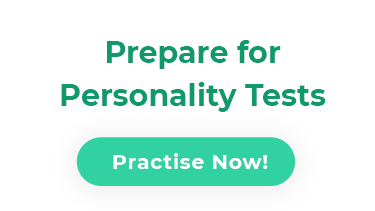NEO Personality Inventory Online Preparation 2024

Job seekers by now must be used to sitting for pre-employment screening tests whenever they apply for jobs. This has become commonplace in the job market as companies have moved from a position of merely separating candidates based on academic aptitude, to employing the use of psychometric assessments to evaluate the personality traits of employees to explore how well their personalities align with the job at hand. The NEO Personality Inventory test is one of the many assessments used for this task.
What Is the NEO Personality Inventory?
The NEO Personality Inventory is a recognised psychological assessment and is accepted worldwide. Companies in the hiring process sometimes use it as a pre-employment psychometric evaluation. The test has been shown to identify personality traits accurately for adolescents and adults alike. The NEO PI-R measures the Big-Five traits: conscientiousness, extraversion, agreeableness, neuroticism, and openness to experience.
What Is the Format of the NEO Personality Inventory Test?
There are two variants of the NEO Personality Test, the NEO PI-R and the NEO Five-Factor Inventory. The NEO PI-R test is an untimed test, which is usually completed within a 90-minute timeframe. The test has 240 questions designed to measure the candidate’s Big-Five personality traits. A second, and shorter exam is known as the NEO Five-Factor Inventory, otherwise called the NEO-FFI has 60 questions. These 60 questions are evenly split, with 12 per trait, and is usually completed in about 15 minutes. Like the NEO PI-R, the test is untimed.
The Traits Examined in the NEO Personality Inventory Test
The NEO test assesses and measures the Big-Five traits, otherwise known as the five-factor model (FFM) or OCEAN (OCEAN is simply an acronym for the Big-Five traits) model, which is a classification of personality traits. The five qualities which the NEO Personality Inventory test measure are:
- Openness to experience – This is a domain that has a number of other facets, namely, aesthetic sensitivity, active imagination, intellectual curiosity, attentiveness to inner feelings, and preference for variety.
- Conscientiousness – A trait which implies that an individual is vigilant. Conscientious people usually do their best to ensure tasks are performed to the best of their abilities and take their obligations seriously.
- Extraversion – A term popularised by Swiss psychiatrist Carl Jung, extraversion is a personality trait in which an individual gains gratification from external sources. Extraverts enjoy the company of others and tend to be talkative, gregarious and assertive.
- Agreeableness – A trait which manifests in an individual being perceived as cooperative, kind and considerate. Persons scoring high on this trait are usually empathetic.
- Neuroticism – Neurotic individuals a perceived as moody. They are more prone than the average individual to experience worry, anxiety, fear, anger, guilt, jealousy, and loneliness.
How to Pass the NEO Personality Inventory Test?
Psychological assessments are always hard to prepare for because there is no real right or wrong answer. The questions are designed to measure where the candidate falls on a scale, with no actual passing or failing grade. Candidates traits, however, need to align favourably with the employer’s needs.
As this is a personality test, there is no study guide per se, but as with all exams, familiarity does go a long way in helping test takers. Becoming familiar with the exam content increases the candidates’ confidence and reduces anxiety. Tackling NEO Personality Inventory test online practice exams, preferably with both questions and answers, can help with getting a good grasp on the content of the exam. The NEO PI-R online practice papers help by providing somewhat of a benchmark from which the candidate can work. This can be coupled with doing what is known as single trait practice, which is tailoring your preparation to zero in on traits which you want to score highest in.
The test is not timed, so there is no need to get flustered over time limits while at the assessment centre.
Conclusion
As with any other test, simply work with the resources available to you and take heed of any seemingly sound tips. After all, there is no such thing as receiving too much help or being too prepared. All the best with your exam preparation.
“You were born to win, but to be a winner, you must plan to win, prepare to win, and expect to win.” – Zig Ziglar

